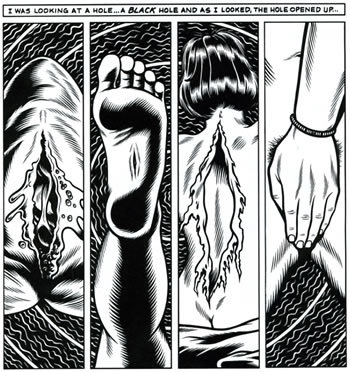All right comics newbs, "hold on ter yer butts" (ala Samuel L.Jackson in "Jurassic Park")because Charles Burns' "Black Hole"is a whole lotta' weird. This, in my limited experience, is one of the weirdest, coolest, most disturbing comics I've read. Essentially "Black Hole" is about a group of teenagers in a non-descript American town growing up in the seventies. "The Bug", a sexually transmitted disease has descended on the town's teenagers, and only teenagers.The disease manifests itself as a series of mutations, some horribly visible others concealable, that once appear can't be cured.The story that follows is a decent into a world twisted by drugs, alienation, hunger, filth, murder, and a search for redemption and escape.

Burns has a truly remarkable drawing style. His high contrast black and white panels and fine line detail create really intense panel sequences.It's impossible to ignore the images because of their clarity and detail, the contrast sucking you in (especially the panels that are overwhelming black with fine white lines) as the images move from panel to panel. When it comes to depicting the mutations, Burns grotesque drawings are done so well I can't help but linger over them in sick fascination. Everything about this book is done so well, so beautifully that it makes the content and meaning all the more impactful and disturbing.

Overarchingly I think "Black Hole" is a riff on the many sides and disturbing aspects of adolescence. "The Bug" acts as a way of alienating, or more abstractly, physically manifests the alienation many teenagers feel in adolescence. Many of the "mutants" that hang out in the woods were the "nerds", "fatties", or "outsiders" at the local high school. It's ironic that almost all of their mutations are blatant, impossible to hide. Two of the main characters of the novel, Chris and her love interest Rob, both attractive and popular, have mutations that are easy to hide but reveal deeper problems such as addictions and trouble at home. In essence I feel that Burns is using the mutations to show how every type of person, whether unpopular or popular, has some issue or part of them that makes them feel completely alone, alienated, ugly, or unrelatable in adolescence. Making "the bug" an STD was also a calculated decision on Burns part. Sex is obviously something society considers an adult act, although a lot of adolescents willingly or unwillingly participate in this "grown-up ritual". Most teens who have sex have gone through puberty, a mutation in itself, and find themselves on this weird plane of existence, on the cusp of adulthood but already far away from childhood. Along with this idea, I also think Burns' decision to set this story in the seventies was an important choice. Historically the seventies was a "lost era". The nation's youth were becoming more and more disenchanted with the war, Nixon's election, and politics. More generally, the enthusiasm and hope of the sixties counter-culture gave way to an over riding sense of hopelessness and the era became categorized by the many forms of escapism sought by adolescents and adults alike, sex and drugs (which are a huge part of "Black Hole") topping the list.


These decisions by Burns, the STD, the seventies, the mutations, all combine to paint a fearful, but ultimately realistic (all-be-it a bit over dramatic, fanciful portrait)portrait of adolescence. The mutations physically manifest the problems and isolation felt by teens. "The Bug", being an STD, is an example of how adolescent impulsive behaviors can often have devastating consequences because many teen's are given no advice or direction in how to deal with these urges or desires. The seventies and the copious drug use in the text exemplifies the urge to escape many teens feel. I don't want to ruin the end of the book, but there is redemption for some of the characters by escaping their situations, but for others, like many teens, the world and the misunderstanding and isolation of adolescences is too much. Burn's has effectively created a unique, compelling, and disturbing view of a moment we all experience.
Until next time,
GN

No comments:
Post a Comment